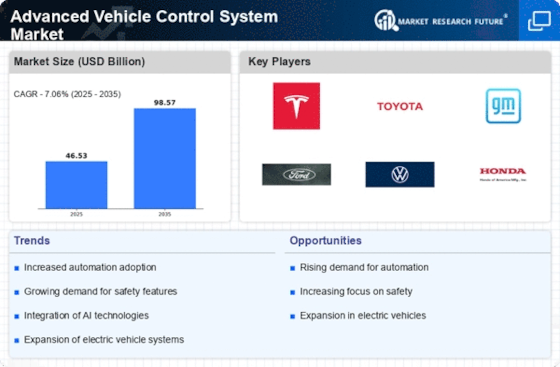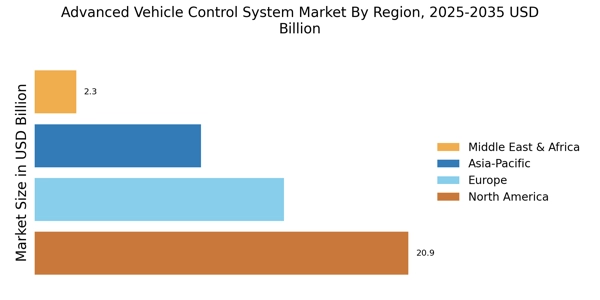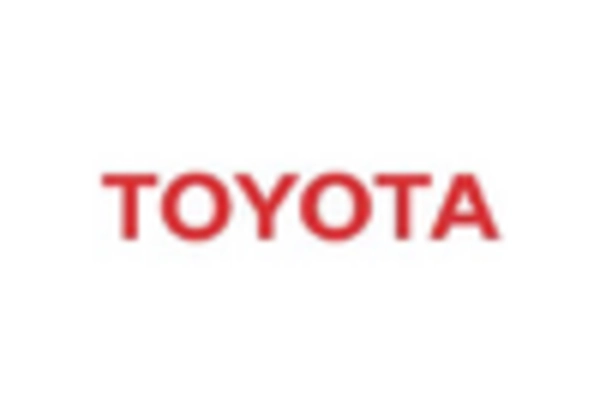Rising Demand for Autonomous Vehicles
The Advanced Vehicle Control System Market is experiencing a notable surge in demand for autonomous vehicles. This trend is driven by advancements in sensor technologies, machine learning, and artificial intelligence, which enhance vehicle automation capabilities. As consumers increasingly seek safer and more efficient transportation options, the market for autonomous vehicles is projected to grow significantly. According to recent estimates, the market for autonomous vehicles could reach USD 60 billion by 2030, indicating a robust growth trajectory. This rising demand is compelling manufacturers to invest in advanced vehicle control systems that ensure seamless operation and safety, thereby propelling the Advanced Vehicle Control System Market forward.
Government Regulations and Safety Standards
The Advanced Vehicle Control System Market is significantly influenced by stringent government regulations and safety standards aimed at enhancing road safety. Regulatory bodies are increasingly mandating the incorporation of advanced safety features in vehicles, such as automatic emergency braking and lane-keeping assistance. These regulations not only promote the adoption of advanced vehicle control systems but also ensure that manufacturers comply with safety protocols. As a result, the market is witnessing a shift towards systems that meet these regulatory requirements. The implementation of such standards is expected to drive the Advanced Vehicle Control System Market, as compliance becomes a critical factor for manufacturers seeking to maintain competitiveness.
Increased Investment in Research and Development
The Advanced Vehicle Control System Market is witnessing a surge in investment in research and development (R&D) activities. Manufacturers are allocating substantial resources to innovate and enhance vehicle control technologies, aiming to stay ahead in a competitive landscape. This focus on R&D is crucial for developing next-generation systems that incorporate artificial intelligence and machine learning, which can adapt to various driving conditions. As a result, the market is expected to benefit from a continuous influx of innovative solutions that improve vehicle performance and safety. The emphasis on R&D is likely to propel the Advanced Vehicle Control System Market, fostering a culture of innovation and technological advancement.
Technological Advancements in Vehicle Control Systems
Technological advancements play a pivotal role in shaping the Advanced Vehicle Control System Market. Innovations in control algorithms, sensor technologies, and communication systems are enhancing the performance and reliability of vehicle control systems. For instance, the integration of advanced driver-assistance systems (ADAS) is becoming commonplace, providing features such as adaptive cruise control and collision avoidance. These advancements not only improve vehicle safety but also enhance the overall driving experience. The market is projected to grow at a compound annual growth rate of 10% over the next five years, driven by these technological innovations that are redefining the capabilities of vehicle control systems.
Growing Consumer Awareness and Demand for Safety Features
Consumer awareness regarding vehicle safety features is on the rise, significantly impacting the Advanced Vehicle Control System Market. As consumers become more informed about the benefits of advanced safety technologies, there is an increasing demand for vehicles equipped with sophisticated control systems. This trend is evident in the growing popularity of features such as blind-spot detection and automatic parking assistance. Manufacturers are responding to this demand by integrating advanced vehicle control systems into their offerings, thereby enhancing the appeal of their products. The heightened consumer focus on safety is expected to drive the Advanced Vehicle Control System Market, as more individuals prioritize safety in their vehicle purchasing decisions.

















